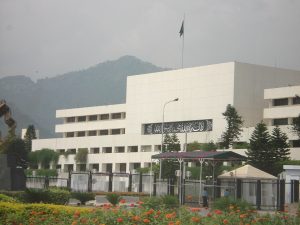Pakistan’s National Assembly swore in newly elected members on Thursday in a chaotic scene, as allies of jailed former Premier Imran Khan protested what they claim was a rigged election.
Lawmakers from Khan’s Pakistan Tehreek-e-Insaf (PTI) party repeatedly chanted “Vote-thief!” as Shehbaz Sharif, who’s expected to form the government, entered the lower house of parliament with his brother Nawaz Sharif. Both men are former premiers.
Outgoing National Assembly Speaker Raja Pervez Ashraf administered the oath to incoming legislators at noon.
The house echoed with chants of “Long Live Sharif!” when the brothers signed the register after taking their oaths of office. Bilawal Bhutto Zardari, the young chairman of the Pakistan People’s Party and a key Sharif ally, was met with similar chants.
The new government will face challenges, including a surge in militant attacks and shortages of energy, as well as an ailing economy that will force Pakistan to seek another bailout from the International Monetary Fund.
Lawmakers from the PTI told reporters that they will continue their campaign against the rigging in the elections in and outside the parliament.
“Yes, the election has been rigged,” said Gohar Ali Khan, the current head of the PTI.
The PTI has called for nationwide rallies on Saturday. The party claims that results were changed in dozens of constituencies to prevent it from winning a majority, a charge the Election Commission of Pakistan denies.
After the February 8 elections, observers from the Commonwealth praised election officials for holding the vote despite multiple militant attacks, but the U.S. State Department said that the vote was held under restrictions on freedoms of expression, association, and peaceful assembly. The European Union also criticized the inability of some political actors to contest the elections. Pakistan’s Foreign Ministry has fired back at such criticism, saying the vote was held in a free, fair, and transparent manner.
None of the foreign observers described widespread vote-stealing.
Sharif’s Pakistan Muslim League-Nawaz party, or PML-N, and the Pakistan People’s Party of former President Asif Ali Zardari emerged from the vote as the largest presence in the 336-seat National Assembly, or lower house of the parliament.
Under a power-sharing formula, Sharif’s party will support Zardari in next month’s presidential elections. Outgoing President Arif Alvi is an ally of Khan and was a senior member of the PTI before becoming president.
Khan is currently serving prison terms in multiple cases and has been barred from seeking or holding office. He has been convicted on charges of corruption, revealing official secrets, and violating marriage laws in three separate verdicts and sentenced to concurrent prison terms of 10, 14, and 7 years. Khan is appealing all the convictions. He still faces some 170 legal cases on charges ranging from corruption to inciting violence and terrorism.
On Wednesday, the PTI wrote a letter to the International Monetary Fund, urging it to link any talks with Islamabad to an audit of the country’s recent election, which his party alleges was rigged. The latest development came days before the IMF releases a key installment of a bailout loan to Pakistan.
Khan’s move had drawn widespread criticism from his rivals, including Sharif, who said Khan wanted to harm the country’s economy. Sharif, who replaced Khan after his ouster through a no-confidence vote in April 2022, had struggled hard to avoid a default on foreign payments last summer when the IMF approved the much-awaited $3 billion.
Sharif has said he wants a new bailout from the IMF after March when last year’s IMF bailout expires.

































